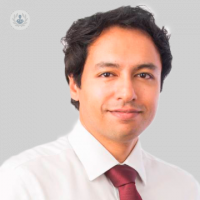Congestive heart failure: how to manage ‘air hunger’ (shortness of breath)
Written in association with:Are you feeling “air hunger” (shortness of breath)? Dr Arjun K Ghosh, a leading London cardiologist, shares his professional expertise with you. Learn from a specialist about what air hunger is, why it happens, how it’s managed and the overall outlook.

What exactly is ‘air hunger’?
Patients with congestive heart failure (CHF) can often feel shortness of breath (air hunger). This usually occurs with activity and as the disease progresses, it can occur with less intense activity and more frequently. The “air hunger” is a manifestation of the fact that the heart cannot pump oxygenated blood around the body as effectively as it should.
How distressing can shortness of breath be?
Shortness of breath can be very distressing for patients, especially if it occurs with minimal effort - which may be the case in progressive and advanced CHF. It may even wake patients from sleep and make them gasp for breath, which is something called paroxysmal nocturnal dyspnoea (PND) which is a sign that patients should seek medical assistance.
Shortness of breath that makes everyday activities a challenge can understandably negatively impact the mood of patients and feel debilitating. Other symptoms of heart failure which may compound this feeling include tiredness and fatigue on exertion as well as ankle swelling.
Why does congestive heart failure cause this symptom?
The “air hunger” is a manifestation of a lack of oxygenated blood getting to all parts of the body. This occurs in CHF patients when the heart muscle does not pump as well as it should. As a result, there is often a poor flow of blood around the body and an accumulation of fluid in the wrong places. Accumulation of fluid in the lungs can worsen symptoms of breathlessness.
Is there a treatment for patients with this symptom?
A number of treatments are available to help with symptoms of CHF, including air hunger. Many of these treatments have also been shown in clinical trials to reduce hospital admissions with CHF and also to prolong life.
Can you offer any advice for managing air hunger?
Patients with such symptoms should be evaluated by a medical professional to determine if they have CHF. If CHF is diagnosed, it should be reviewed by a cardiologist so that prognostic medication can be started as soon as possible. At that review, they should be given comprehensive guidance on how to make lifestyle changes to improve symptoms. They should also be given a tailored cardiac exercise programme to ensure that they optimise their cardiovascular fitness.
What is the outlook like?
The outlook depends on how quickly a diagnosis is made and how quickly prognostic medications are started. The quicker both of these are instituted, the better the prognosis is and people in that situation can live for years with this chronic condition.
For further information and professional expertise in the diagnosis and management of congestive heart failure and its symptoms, visit Dr Ghosh’s profile.


